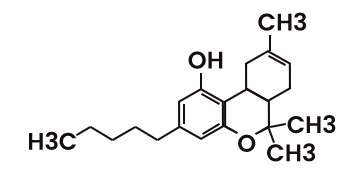When most people think about cannabinoids, both CBD (Cannabidiol) and 9-THC (Tetrahydrocannabinol) are likely to be the first things that come to mind. Although these are the most well known, there are well over 100 different cannabinoids in the hemp plant, each with different properties and uses which are still being discovered and researched.
While most of these lesser known cannabinoids are not psychoactive, there are exceptions, one of which is Delta-8-THC. You may have heard about Delta-8-THC recently, with many North American and European businesses beginning to advertise Delta-8 products in the past year or so – particularly over social media, podcasts and YouTube. Having grown in popularity so quickly, now’s the perfect time to understand the current trend of Delta-8.
Is Delta-8 legal in the UK?
While there is no legislation which refers to Delta-8-THC specifically (and it’s not mentioned in the UK government’s cannabinoid licensing guidance), it is generally understood that Delta-8-THC is an illegal substance, to the same degree that regular Delta-9-THC is.

It’s very important to understand that UK law prohibiting Delta-9-THC also covers THC derivatives and analogues. Simply put – any substance that is very chemically similar to 9-THC is illegal by default. This is why Delta-8 is increasingly popular overseas but not in the UK. Derivatives and analogues are not commonly prohibited in many countries, where UK law is quite unique in its strictness. This is why Delta-8 has been so heavily marketing to US audiences in recent years – only Delta-9-THC is prohibited under their federal law.
When speaking to journalists in 2021, the UK home office stated: “Delta-8 THC is a cannabinol derivative that is controlled as a Class B drug under the Misuse of Drugs Act 1971.” Make no mistake, just because Delta-8 is freely traded abroad does not make it legal to possess or trade in the UK.
What effects does Delta-8 have?
Delta-8-THC is psychoactive, meaning it affects how a user feels in much the same way as 9-THC. Users report similar effects like euphoria, relaxation and improved appetite. These effects are generally regarded to be milder than 9-THC and wear off more quickly.
This isn’t to say that Delta-8 is “weak” however. In high doses it is capable of heavily inebriating a user and producing side effects like dry mouth, dry eyes and drowsiness. While these side effects can be significant, users report that they are comparably no more intense than those found with Delta-9 products.
How is Delta-8 metabolised?
Once ingested, Delta-8 is metabolised into “11-hydroxy-THC”. This might sound familiar because it’s the same metabolite which occurs when a person consumes a Delta-9 edible.
This means that the effects of eating Delta-8 and Delta-9 are nearly identical, with intense long-lasting effects delivered by both. For this reason, it’s understandable that UK law treats Delta-8 and Delta-9 the same.
Is Delta-8 natural?
Yes, Delta-8-THC is a cannabinoid which is naturally found in the hemp plant – it is not synthetic. However the amount of Delta-8 in a plant is usually very low, much lower than the other cannabinoids which people are interested in.
Because it only arises naturally in small amounts, when Delta-8 is produced for commercial products, it is most often not extracted from the plant. Instead, it is created by a chemical process from CBD. This process often involves use of industrial solvents, powerful acids and other chemicals which are anything but natural. For this reason, it’s best to assume that any Delta-8 products available outside of the UK have a very low chance of using “natural” Delta-8.
Is Delta-8 safe?
Because industrial production of Delta-8 is only a few years old, there is very little history of what happens when it is used in significant amounts, beyond the trace amounts in hemp. This means that there is little-to-no information on how it impacts a user’s health over-time, and most importantly there is very little medical and scientific research on Delta-8’s impact.
For these reasons, there’s no way of knowing what the safety profile of Delta-8 likely is. It may take several decades before adequate research has been completed which will allow Delta-8’s safety to be fully understood.
Beyond Delta-8 itself, the production process often involves dangerous chemicals that must have adequate safety controls. If the manufacturer is careless, there’s a strong possibility that the product could contain a range of chemicals which are harmful to human health.
CBD remains a better choice in regards to safety. Although it has less pronounced effects in some regards, it is known to be much safer, with several decades of research indicating that CBD poses little risk to health, instead supporting a healthy lifestyle.
Are Delta-8 and CBD similar?
Both Delta-8 and CBD interact with the body’s CB1 and CB2 receptors, typically resulting in reduced anxiety, reduced inflammation, pain relief and stress relief. The main distinction between the two is that Delta-8 is psychoactive (meaning it provides a “high”) while CBD is not at all.
As such, CBD is legal because it is not psychoactive, while Delta-8 is not legal to possess in the UK.
What do businesses need to know about Delta-8?
While we’ve discussed a number of barriers for Delta-8’s use in the UK, it remains an interesting topic. Hemp and cannabinoid laws around the world are developing at a rapid pace and show no signs of slowing, as the public becomes more aware of their benefits from products like CBD. It’s unlikely that demand for Delta-8 in countries and territories where it is legal will slow down any time soon.
Because it is so chemically similar to CBD and Delta-9-THC and involved in many industrial processes in the cannabis industry it is likely to be an important consideration for many years to come, in legal countries.
If research concludes that Delta-8 is safe for human consumption, like CBD, it is likely to be sought after as a milder form of traditional 9-THC where legal; wearing off more quickly, creating less pronounced effects.